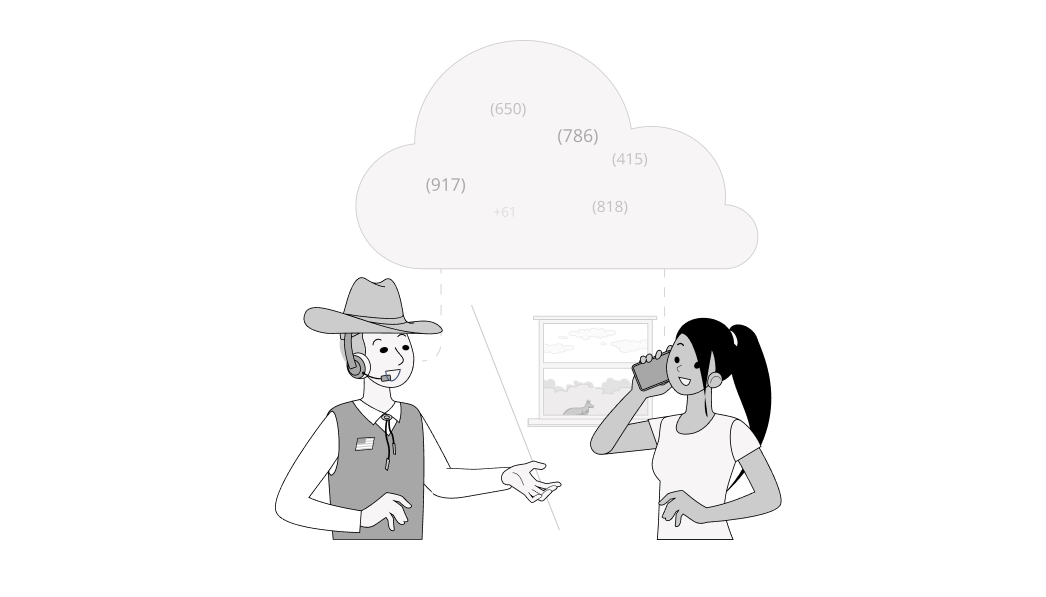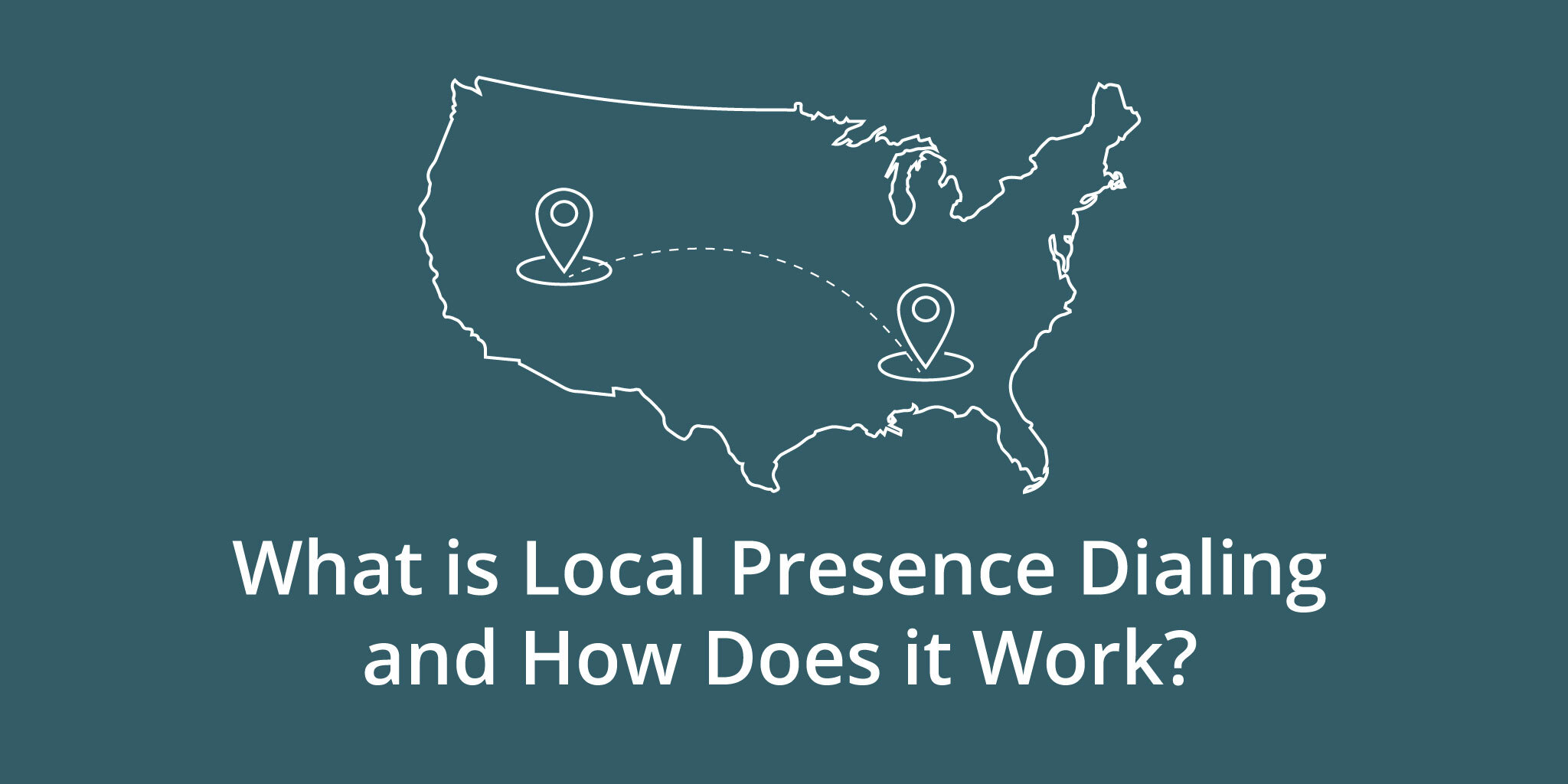In today’s highly competitive business environment, establishing a meaningful connection with prospects is more challenging than ever. With the rise of spam calls and the increasing skepticism of consumers, getting someone to answer an unexpected call can feel like an uphill battle. This is where local presence dialing comes into play—a powerful tool designed to enhance your outbound calling strategy by increasing the likelihood that your calls will be answered.
This article will delve into the intricacies of local presence dialing, exploring how it works, when to use it, and how it differs from practices like number spoofing. We’ll also introduce advanced solutions like Kixie’s ConnectionBoost that take local presence dialing to the next level.
Already know what you’re looking for? Jump to:
- When Should I Use Local Presence Caller ID?
- Is Local Presence the Same as Number Spoofing?
- Advanced Local Presence (ConnectionBoost)
- Frequently Asked Questions
- Get Started Calling With Local Numbers
The Challenges of Cold Calling in the Modern Era
Cold calling in 2024 is harder than it has ever been. With smartphones and cell networks equipped with advanced spam detection features, consumers are more vigilant and discerning. The rise of fraudulent robocalls has conditioned people to ignore calls from unknown numbers, making it a small miracle when someone actually answers a cold call.
This landscape necessitates innovative strategies to reach potential customers effectively. Local presence dialing emerges as a critical technology in this context, significantly improving the chances of your calls being answered. But what exactly is local presence dialing, and how does it make such a difference?
What Is Local Presence Dialing?
Local presence dialing is a feature that allows outbound calls to display a local area code on the recipient’s caller ID, regardless of where the call is actually originating from. By appearing as a local number, the call seems more familiar and trustworthy to the recipient, increasing the likelihood that they will answer.
Think about it from the customer’s perspective. If your caller ID displays as “Spam Risk” or “Telemarketer,” you’re unlikely to pick up. Even if it’s just an unfamiliar number, you might still hesitate. However, if the caller ID shows a local number—perhaps even one that matches your own area code—you might assume it’s an important call from a local business or service provider, such as a doctor’s office or auto mechanic.
According to a recent study by Software Advice, using a local presence dialer when cold calling increased connection rates by an astounding 400%. This dramatic improvement highlights the effectiveness of local presence dialing in overcoming the initial barrier of getting prospects to answer the phone.

When (And When Not) to Use Local Presence
While local presence dialing is a powerful tool, it’s essential to use it judiciously. There are specific scenarios where it can significantly enhance your outreach efforts, and others where it might be counterproductive or even damage your relationship with the customer.
Use Local Presence When:
- Cold Calling Prospects: When reaching out to potential customers who are not expecting your call, local presence can increase the chances that they will pick up.
- Overcoming Call Screening: If you suspect that a customer is screening your calls, using a local number might encourage them to answer.
Don’t Use Local Presence When:
- The Customer Is Expecting Your Call: In situations where the customer anticipates hearing from you, using your actual number maintains transparency and builds trust.
- Established Professional Relationships: If you’ve already built a rapport with the customer, continuing to use your regular number reinforces the relationship.
Consider Carefully Whether to Use Local Presence When:
- Leaving Voicemails: If you plan to leave a voicemail asking the customer to call you back, using a local presence number might confuse them when they try to return the call.
- Risk of Perceived Deception: If there’s a chance the customer might feel “tricked” into answering, and this could harm your relationship, it’s best to avoid using local presence.
In essence, local presence dialing is most effective when used to initiate contact or re-engage with prospects who are difficult to reach. However, it’s crucial to balance the benefits with the potential risks to customer trust and satisfaction.
Types of Local Presence Dialing
Local presence dialing can be implemented in various ways, each with its own advantages and considerations. Understanding these types will help you choose the method that best aligns with your business needs and ethical standards.
Number Spoofing
If you have negative associations with the concept of local presence dialing, number spoofing is likely the reason why. Number spoofing involves altering the caller ID to display a number that you do not own, often without the recipient’s consent or knowledge. This practice is commonly used by fraudulent callers and is a significant contributor to the rise in spam and scam calls.
If you’ve ever received a call that appeared to come from your own phone number or a number similar to yours, the caller was likely spoofing. Most of the “Spam Risk” or “Telemarketing” calls you receive are the result of number spoofing.
Important Note: We strongly discourage the use of number spoofing. Not only does it erode trust with prospects, but it also violates Federal Communications Commission (FCC) regulations and can result in substantial fines and legal repercussions.
Privately Owned Number Pools
Larger companies, such as multinational corporations, often own extensive pools of phone numbers across different regions or even countries. These companies use private phone systems that can automatically cycle through these numbers when making outbound calls. This legitimate form of local presence dialing enhances their ability to connect with customers on a global scale.
For small and medium-sized businesses, owning such an extensive number pool can be cost-prohibitive. However, there are scalable solutions that allow businesses of all sizes to benefit from local presence dialing without incurring excessive costs.
At Kixie, we offer private, shared local number pools that are affordable and customizable based on your target areas. These pools can include international numbers, which is particularly beneficial if your team is reaching out to prospects in different countries. International local presence can alleviate concerns about accepting international calls, which some people avoid due to potential costs.
It’s important to note that even when using legitimate, non-spoofed phone numbers, there’s still a risk of being flagged as spam. Consumers can easily report numbers, even if the call was legal and appropriate. Therefore, it’s crucial to take proactive steps to prevent your calls from being labeled as spam.
Using local presence number pools offers an additional advantage: protecting your primary business number. By dialing from a pool of numbers, you reduce the risk of your direct line being flagged as spam. If one of the numbers in the pool is flagged, it can be replaced without affecting your main contact information.
With Kixie’s local presence number pools, if a number is flagged as spam, we automatically switch it out and replace it with a fresh number at no extra charge, ensuring minimal disruption to your outreach efforts.
Advanced Local Presence (ConnectionBoost)
For businesses seeking an even more robust solution, Kixie’s ConnectionBoost offers advanced local presence capabilities. This innovative feature allows you to access over 50,000 real phone numbers worldwide, providing unparalleled flexibility and reach.
ConnectionBoost combines three powerful features into one solution:
- AI-Powered Global Local Presence: Automatically matches your caller ID to the area code of the number you’re calling, selecting the phone numbers most likely to be answered based on dynamic algorithms.
- Progressive Caller ID: Changes your phone number each time you call a prospect, ensuring you never use the same number twice in a row. This approach increases the chances of your call being answered without appearing repetitive or intrusive.
- Spam Detection and Number Replacement: If a ConnectionBoost number is flagged as spam, Kixie detects the decrease in connection rates and proactively replaces the number with a fresh one, maintaining the effectiveness of your outreach.
ConnectionBoost eliminates the need for your own expensive number pools while providing access to a vast network of numbers. This feature is especially beneficial for high-volume calling campaigns and businesses targeting multiple regions or countries.
By leveraging ConnectionBoost, along with Kixie’s suite of inbound and outbound calling tools, your team can significantly improve cold calling success rates and overall sales performance.
The Benefits of Local Presence Dialing
Implementing local presence dialing in your sales strategy offers numerous advantages:
- Increased Answer Rates: As studies have shown, calls displaying a local area code are more likely to be answered.
- Enhanced Trust and Credibility: A local number feels more familiar and trustworthy to recipients.
- Improved Efficiency: By connecting with more prospects, your sales team can achieve better results in less time.
- Protection of Primary Numbers: Using number pools safeguards your main business lines from being flagged as spam.
- Scalability: Advanced solutions like ConnectionBoost allow you to expand your reach without significant investment in infrastructure.
Frequently Asked Questions
1. Is Local Presence Dialing Legal?
Yes, local presence dialing is legal when implemented correctly. Using numbers that you own or have the right to use is permissible. However, practices like number spoofing, where you display numbers you do not own, can violate FCC regulations and lead to legal consequences.
2. How Does Local Presence Dialing Affect Customer Trust?
When used appropriately, local presence dialing can enhance customer trust by making your calls appear more relevant and less intrusive. However, overusing it or employing deceptive practices can damage trust. It’s important to use local presence dialing as a tool to connect, not to deceive.
3. Can I Receive Calls Back on Local Presence Numbers?
With solutions like Kixie’s local presence number pools, inbound calls to these numbers can be routed back to your team. This ensures that if a prospect returns your call, they are connected to the right person or department.
4. How Do I Prevent My Numbers from Being Flagged as Spam?
Maintaining good calling practices, such as adhering to call frequency limits and respecting do-not-call lists, can help. Using features like Kixie’s spam detection and number replacement ensures that any numbers flagged as spam are promptly addressed.
5. Is Local Presence Dialing Suitable for International Calls?
Absolutely. International local presence can significantly improve answer rates when calling prospects in other countries. By displaying a local number, you reduce concerns about international call charges and increase the likelihood of engagement.
Get Started Calling With Local Numbers
In an era where connecting with prospects is increasingly challenging, local presence dialing offers a strategic advantage. By leveraging this technology, your sales team can overcome barriers, increase answer rates, and ultimately drive more conversions.
At Kixie, we’re committed to helping businesses like yours succeed. Our advanced local presence solutions, including ConnectionBoost, are designed to empower your team with the tools they need to excel.
We’d love to answer your questions about local presence and provide personalized recommendations for building your sales tech stack. Reach out to our team for a demo, or use the chat feature in the bottom right corner of this page. Let’s work together to elevate your sales strategy and achieve your business goals.
Final Thoughts
Cold calling doesn’t have to be a shot in the dark. With the right tools and strategies, you can significantly improve your connection rates and make meaningful contact with potential customers. Local presence dialing is a proven method to enhance your outbound calling efforts, making your team more efficient and effective.
Whether you’re a small business owner or part of a large sales team, Kixie offers scalable solutions tailored to your needs. Don’t let your calls go unanswered—take advantage of local presence dialing and see the difference it can make.
Ready to transform your cold calling strategy? Get started with Kixie today!



